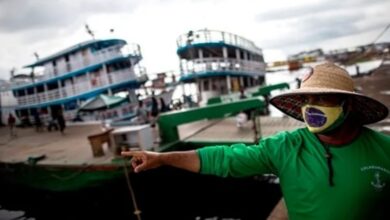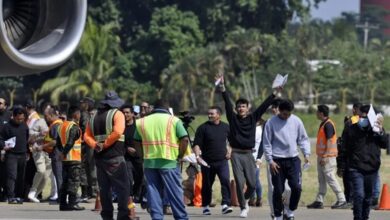Health systems in crisis and other 3 news from Latin America
The coronavirus crisis worsens in Latin America and other news of the week.

these are the most relevant news this week. / Photos: twitter.com/conagua_clima, Reuters
LatinAmerican Post | Juliana Suárez
Listen to this article
Leer en español: Sistemas de salud en crisis y otras 3 noticias de América Latina
Latin America has been experiencing the most critical moment of the pandemic for several weeks and poverty begins to loom as some health systems are on red alert.
Currently, the region represents more than half of coronavirus cases worldwide. Brazil, Mexico, Peru, Chile, Colombia and Argentina, some of the main countries in the region, are already in the 20 positions with the most infections in the world, but behind them are other countries such as Bolivia, Ecuador and the Dominican Republic, which worries national and regional authorities.
The two main problems with the increase in cases is that the economies of these countries, which are mostly informal, are being affected without the near possibility of stabilizing, while the health systems are also in danger in some countries, preventing the normalization of life.
The first country to see a hospital crisis was Chile, when in June its capital saw the capacities in the ICUs being exceeded and in some hospitals it was denounced that they had to choose "what lives to save". Now, health systems like that of Colombia are on red alert, as is the case in the department of Antioquia, one of the biggest in the country.
Also read: What will the economic recovery be like in Latin America?
On the other hand, at the beginning of the increase in cases in Latin America, in April, Ecuador saw people pass out on the streets while funeral services collapsed. Today, the same is starting to happen in Bolivia, which went from having 2,200 deaths in four months, to having more than 400 in less than a week. While criticism is split between the interim government and the ex-government of Evo Morales for the precarious health system, people have begun to die on the streets.
As a consequence of the difficult situation facing the region, the UN has called for international cooperation focused on helping these countries, especially those most affected. In a statement , the organization warned that the numbers of deaths in the region are increasing by 9 percent from one week to the next and that "the pandemic is moving from cities to smaller places," with rural areas in some countries being affected, as is the case of Guatemala.
Meanwhile, these are three other main news from the region
Hanna hits the carribean
Since the end of May, the hurricane and tropical storm season seemed to be hitting the Caribbean hard, and its most recent move has been that of the Storm Hanna in northern Mexico.
According to the national coordinator of Mexico's Civil Protection, David León, in its visit this week, Hanna left at least 3 dead and 4 wounded in the country. Likewise, he affirmed that there were "more than 320 damages to public infrastructure" and reported Nuevo León and Tamaulipas as the most affected states.
Hoy, #Hanna continuará generando abundantes acumulados de #Lluvias en #Coahuila, #NuevoLeón y #Tamaulipas, con probable formación de #Tornados. Extremar precauciones por aumento en los niveles de ríos y arroyos e inundaciones en zonas bajas. pic.twitter.com/s8UOeH1KH0
— CONAGUA Clima (@conagua_clima) July 26, 2020
The storm has also affected South Texas and consists of gusts of more than 80km / h, leaving flooding in the states mentioned in Mexico and the United States. In addition to infrastructure damage and flooding, some affected places have been left without electricity and impassable streets.
Complaints against Bolsonaro
Brazil is the second country in the world with the most infections and deaths, representing about 25 percent of cases worldwide. This is largely attributed to its president's position on the virus. Over the months, other countries and organizations, including the WHO, have criticized the way in which Jair Bolsonaro has treated the virus, calling it a "flu", even though he has been infected.
As a more recent reaction, at least one million health workers have denounced him against the International Criminal Court for genocide and crimes against humanity. This becomes the fifth complaint filed with the ICC against the president for his management during the pandemic. On this occasion, the complaint was made by the Brazilian Union Network UNISaúde and they claim that his "negligent and irresponsible actions" put health professionals and the entire population at risk.
In the complaint, it was presented as one of the arguments that the president has defended the use of hydroxychloroquine as a treatment for all patients, a drug used for malaria whose efficacy has not been proven against Covid. It was also argued that the President has attended and promoted massive public events, especially demonstrations he has held in front of Parliament to protest against some congressmen who support strict measures of confinement. In these demonstrations, in addition, he has also been seen without masks.
Historical measure in Chile
The Chilean Congress approved a measure that aims to economically alleviate citizens during the Coronavirus crisis. In a 15-day process, they managed to approve "the withdrawal of up to 10% of pension savings managed by private pension insurers or AFPs," according to the BBC. The approval of this measure caused a great celebration in Congress as they consider it an effective response to the economic contraction and the increase in unemployment generated in these months.
This measure, called the “10% law” will allow for the first time to withdraw a portion of these funds managed by private insurers, an initiative that was created during the Augusto Pinochet government and since then has been considered a pillar of the Chilean economy.
#RetirodeFondos | El Senado aprobó la reforma constitucional que permite el retiro excepcional de fondos previsionales. La norma regresa a la @Camara_cl para su tercer trámite.
¿En qué consiste el proyecto? Aquí lo explicamos en 11 claves.
Buenas noches. pic.twitter.com/jMwjncMNSF
— SenadoChile (@Senado_Chile) July 23, 2020
Given what this represents and some of it's negative consequences, the government and private insurers opposed the measure. However, it had great support from the population, since pensions have long been a matter of debate in the country, as it is reported that they are very low and represent less than a minimum wage. The law has been seen by supporters as a first approach to a pension reform that has been debated for years.




